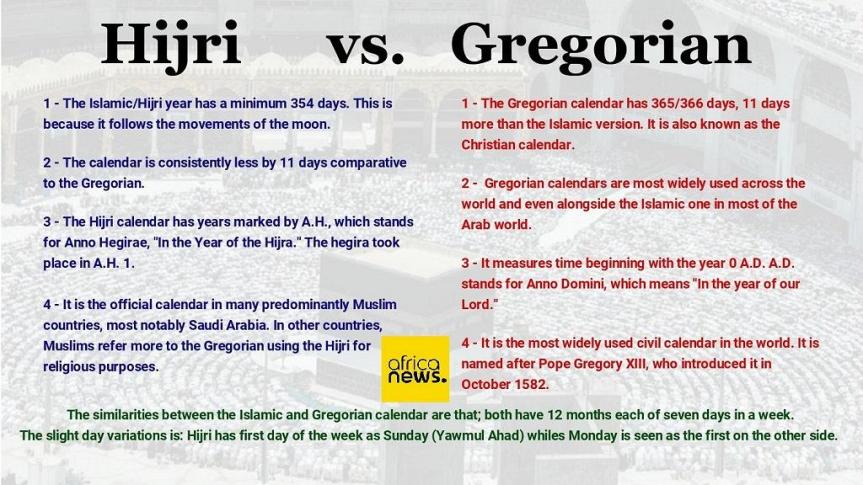—On an unrelated note, I like the word Luna. Man in the Moon Tsar Luna. The witch Luna Lovegood. And the likes.
Islamic/Hijri Calendar is based on the lunar system (based on the moon phases), and lunar year is not dependant on varying seasons or weather conditions unlike Gregorian calendar which is based on the solar system (based on the seasons or the sun’s apparent position relative to the stars). While today is Gregorian’s New Year date of 1 January 2019, Islamic New Year will start in 30 August 2019, a.k.a. 1st of Muharram which is the first month in the Islamic Calender. The wording is usually “Islamic year is 11-12 days lesser than Gregorian” so I wondered which came first? (Not that it’s important in an immature sense but curiosity is curiosity.)
Well, the oldest calendar is a lunar calendar, which was mesolithic arrangement of 12 pits and an arc found in Scotland 10k years ago. There are 7 other lunar calendars: Javanese, Nepal, Gezer, Haida, Assyrian, Yoruba, and Igbo calendars. Meanwhile there are 5 solar calendars: Gregorian, Iranian/Jalāli, Indian/Saka, Ancient Armenian, and Bengali.
My point is, there’s many. When it comes to the basis, between the sun or the moon, I don’t find any reason why someone would tell a Muslim they can’t celebrate the solar calendar’s new year just because their religion use a lunar calendar.
Maybe the creators? Umar bin Al Khattab, 2nd Caliph, was the one who initiated the Islamic calendar after he realized letter delivery was getting delayed because there were no specific year dates and only months at 16 July 622 M (side-note, Rasulullah was there during the meeting Umar called. Rasulullah still lived at this point—he died a decade later at 8 June 632 M). Flipside, Pope Gregory XIII introduced Gregorian Calendar in October 1582, which is Ramadan 990, meaning Islamic calendar was developed 3 centuries earlier (though as stated earlier, who “won the race” first isn’t legit). Between Umar and Gregory… well, I don’t know them. I don’t study about them. I also assume the person who says ‘You can’t celebrate 2019!’ to a Muslim didn’t do it because they like Mr. Umar better than Mr. Gregory (no offence, everyone).

I’ve found a rather passionate writing about why Muslims can’t. Apparently celebrating Gregorian New Year is celebrating Christian religious festival (even though Gregorian is not exclusively used by Christians, same way Apple smartphones aren’t exclusively Steve Jobs’) and the writer mentioned doing so is a great danger to aqidah (belief) about ‘whoever imitates a people is one of them’.
I wonder if there’s a difference when one’s motivation is taken into account. Days are days. I mainly use this big, international event as an excuse to reconnect with people who contributed a color to the canvas that is my short, mortal life, not to celebrate another’s religion ritual. Does the intention (which is a big thing in Islam) play a part? At the moment of posting this, I feel subdued, recalling how many friends I’ve cheered up with my little drawing and best wishes for their on-going life, though a pious friend of mine once said making people happy isn’t a legit reason because happiness isn’t a legit reason because humanity is on Earth by Adam’s mistake with the Forbidden Tree so there’s no point in being happy or doing things on the basis of #yolo.
Add your input or correct me if I’m wrong with legit references too, please. I’m also learning still. I could be wrong but I was born not knowing this and I simply want to learn about it.
References
Amin, M. F. (2018). The Method of Determining Lunar Month of Four Madhhab. Hayula: Indonesian Journal of Multidisciplinary Islamic Studies, 2(1), 17-32.
Amir, R. (2017). Metodologi Perumusan Awal Bulan Kamariyah di Indonesia. Elfalaky, 1(1).
Basic elaboration of the differences between the two calendars can be read here.Durrani, K. K., Hankir, A. Z., & Carrick, F. R. (2019). History and Principles of Islam and Islamophobia. In Islamophobia and Psychiatry (pp. 33-40). Springer, Cham.
Bennett, B. S. (2018). Intercalation in the Traditional Setswana Calendar. Botswana Notes and Records, 50.
Hidayatullah, S. (2018). Global Hijriyah Calendar as Challenges Fikih Astronomy.
Jordaan, R., & Carey, P. (2018). The masonic system of time-reckoning in Java and the elevation of Thomas Stamford Raffles as Sovereign Prince of the Rose Croix. Journal of the Malaysian Branch of the Royal Asiatic Society, 91(1), 89-91.
Kolachana, A. et al. (2018). The Candrarki of Dinakara: A Text Related to Solar and Lunar Tables.
Kurz, M. (2018, October). Protectors, Statesmen, Terrorists? Gender and Masculinities in Muslim Texts and Contexts. In God’s Own Gender? (pp. 103-134). Ergon-Verlag.
Nothaft, C. P. E. (2018). Scandalous Error: Calendar Reform and Calendrical Astronomy in Medieval Europe. Oxford University Press.
Rashed, M. G., Moklof, M. G., & Hamza, A. E. (2018). Investigation the Arithmetical or Tabular Islamic calendar. NRIAG Journal of Astronomy and Geophysics, 7(1), 20-21.
Saelee, C., Tawonatiwas, M., & Yodintra, S. (2018). Suvarnabhumi-Gregorian Rule to Determine Whether Thai Lunar Calendar Year 2012 is a Leap-month Year. Chiang Mai Journal of Science, 45(6), 2491-2508.
Salman Irag Al-Najaf, F. A., Salehi, M., & Nimr Al-Maliki, H. S. (2018). The effect of Islamic sacred months on stock prices in Iran and Iraq Stock Exchanges. ISRA International Journal of Islamic Finance, 10(1), 111-119.
Sklenar, I. (2017). Sensationalism or Truthfulness and Accuracy in Information and Analytical Publications on Religious Topics (on the materials of printed mass media and internet-publications). Ukranian Information Space, 177.
Story of how Umar realized that problem can be read here.
Teng, C. C., & Yang, J. J. (2018). Chinese Lunar New Year effect, investor sentiment, and market deregulation. Finance Research Letters.
The passionate writing about why Muslim can’t celebrate Gregorian New Year which was mostly referred as another religion’s religious ritual can be read here.

